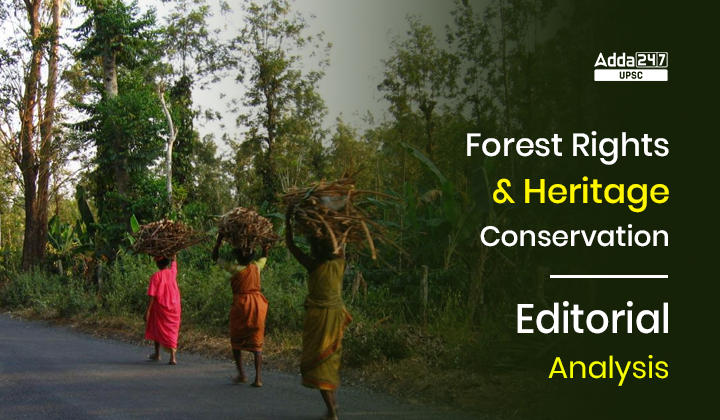Table of Contents
Relevance of Today’s The Hindu Editorial Analysis for UPSC
The Hindu Editorial Analysis covers Forest Rights and Heritage Conservation covers GS 2 – Government Policies & Interventions, GS 3 – Conservation.
DTE Magazine (August 2022, Part 2): Spectrum Of Rights Under FRA 2006
What is the issue?
- The Scheduled Tribes (STs), and other traditional forest dwellers like Scheduled Castes (SCs), Other Backward Classes, minorities and the general category in Karnataka said that they weren’t aware of the process that leads to the declaration of UNESCO heritage sites.
- This reveals that the declaration of world heritage site or earlier, when protected areas were notified, did not take place in a transparent way.
Kunming-Montreal Global Biodiversity Framework (GBF): Landmark Pact at COP 15 of CBD
Background Story
- Of the 39 areas declared by the UNESCO in 2012 as being critical for biodiversity in the Western Ghats, 10 are in Karnataka.
- Before recognising areas as world heritage sites, UNESCO seeks the opinion of the inhabitants on the implication of the possible declaration on their lives and livelihoods.
- But it has been found that the traditional forest dwellers of Karnataka near the potential UNESCO heritage sites were unknown about that.
- The Forest Rights Act (FRA) says that the claims of the forest dwellers must be less than the ceiling of 4 hectares permitted.
- Majority of the forest dwellers claimed land measuring not more than one acre.
- Rejection rate of the other traditional forest dwellers was two times more than the STs.
What are the reasons People are Rejecting Forest Rights Act(FRA)?
- In the case of the STs, the reasons were attributed to
- fresh encroachments;
- the claimants not living on the lands claimed;
- claimed lands being on ‘ paisari bhoomis’ (wasteland and forest lands which have not been notified as protected forests or reserved forests) or revenue lands; and
- multiple applications made in a single family.
- In the case of other traditional forest dwellers, it was mainly failure to produce evidence of dependency and dwelling on forest land for 75 years.
- The FRA recognizes the rights of the STs because of their overall backwardness. But, most people felt there should be a closure to this Act.
DTE Magazine (August 2022, Part 2): Why Are Forests Losing Their Nitrogen?
Which Kind of Restrictions do People Falling Under ESZ Face?
- The people in the villages falling under eco-sensitive zones are experiencing severe restrictions on their entry into the forest.
- Following the stringent implementation of rules in the ‘protected areas’, there is a decrease in illegal tree-felling and poaching.
- Farming is not allowed in a normal way, a slight sound is demurred, the use of fertilizers is banned, and even a small knife is not allowed to be carried into the forest.
- Development activities like road repair has been stopped.
- But these restrictions were in enforcement from the time these areas were declared as protected areas and not necessarily after their declaration as world heritage sites.
Impacts of these Restrictions
- The increasing animal insurgency is causing damage to the crops of the farming forest dwellers.
- Those who don’t have recognition over their lands aren’t compensated for the loss.
- Monkeys and snakes released from urban settings into the forests enter their houses.
- Owning livestock in the villages close to forests is more challenging than in regular revenue villages.
- In the areas where irrigation projects have come up, the people reported that grazing lands have been taken over by the government to compensate for the forest land lost to such projects.
What is the current status?
- Most forest dwellers were still deprived of basic facilities and other government benefits extended under various schemes and programmes. This is beacuse they don’t possess the ‘Records of Rights, Tenancy and Crops’ that is required along with the title of the land.
- People refuse to re-locate on grounds of their attachment to the land fearing extinction of their culture and religious roots.
- The Gram Sabha appears supreme in the Act in deciding the ‘proposed resettlement’ as it has to give ‘free informed consent’. However, this does not happen on ground.
Way Forward
- The government must bring more clarity to the FRA Act to avoid conflicts between the government agencies conserving biodiversity and the people living in the forest for over decades and centuries.
- The conservation of biodiversity requires special attention. Yet, forest dwellers willing to live in the forest must be allowed to stay.
- Many of them comply with the norms of the eco-sensitive zone because they do not depend on modern development needs such as the the use of fertilizers and mobile phones.
- In the same breath, those wanting to experience the fruits of development must be relocated according to their choice of a new place and a suitable package.
- This can be possible only when the areas declared as ‘protected’ are arrived at after consultations with the local population.
ou may also find these Useful:
(Recent Editorial Analysis by our team at Adda247)



 TSPSC Group 1 Question Paper 2024, Downl...
TSPSC Group 1 Question Paper 2024, Downl...
 TSPSC Group 1 Answer key 2024 Out, Downl...
TSPSC Group 1 Answer key 2024 Out, Downl...
 UPSC Prelims 2024 Question Paper, Downlo...
UPSC Prelims 2024 Question Paper, Downlo...
